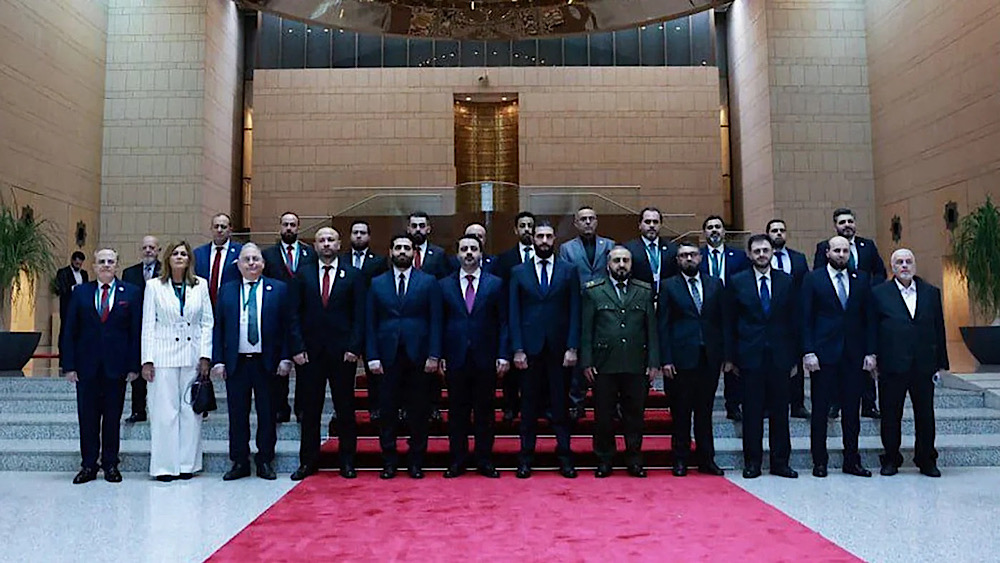Interim Damascus government: 23 ministers and one woman, the Catholic Hind Kabawat
The announcement over the weekend by President al-Sharaa, who confirms the commitment to build ‘a new state’. He should remain in office for five years and lead the country to the writing of the new Constitution and the first post-Assad political elections. The Kurds have rejected the new government, denouncing the lack of (real) involvement of minorities.
Damascus (AsiaNews) - The new Syrian interim government, presented over the weekend by President Ahmed al-Sharaa and composed of 23 ministers, includes a Christian woman, the only woman in the executive called upon to revive a country marked by almost 14 years of war and violence: She is Hind Kabawat, former member of the committee in charge of the work for the new Constitution and long active in inter-religious dialogue and women's emancipation, who has been assigned the Ministry of Labour and Social Affairs.
The new leadership in Damascus lacks a prime minister, but includes Druze and Alawite members of the ethnic-religious minorities and veterans of the uprisings against the former regime of Bashar al-Assad; however, the new government has rejected the Kurds, who represent the majority in the north-east of the country.
According to the intentions of interim president al-Sharaa, the executive should remain in office for five years, the time foreseen for the writing of the new Constitution and the holding of the first political elections. In his presentation speech he spoke of ‘the birth of a new phase in our national process’ in a ‘common’ perspective of building ‘a new State’.
‘We will try to rehabilitate industry, protect national products and create an environment that encourages investment in all sectors. We will also endeavour to reform the monetary situation, strengthen the Syrian currency and prevent manipulation,’ he added.
The ministers are mostly Sunni Muslims, reflecting the demographics of the country once ruled by the Assad clan, who came from the Alawite Muslim minority. Analysts and experts agree that the key positions are occupied by the president's ‘war comrades’, former members of the ‘government of salvation in Idlib’, the northern province that was a rebel stronghold during the civil war (2011-2024).
Among these are Asaad al-Shaibani, who maintains his position as head of diplomacy, and Mourhaf Abou Qasra, who remains in Defence after having commanded the operations that overthrew the old regime.
The latter has the onerous task of rebuilding the Syrian army. Anas Khattab, a former jihadist who headed the General Intelligence Directorate, will be the new Interior Minister and Mouzhar al-Waiss will be the new Justice Minister.
He replaced Shadi Mohammad al-Waisi, who had been called upon to resign by activist groups after the circulation of old videos linking him to the execution of two women accused of prostitution in Idlib.
Yarub Badr, a member of the Alawite religious community to which Assad belongs, has been appointed Minister of Transport, while the Druze Amgad Badr and the Christian Hind Kabawat will head the Ministries of Agriculture and Labour and Social Affairs.
The only woman in the executive has long been a critic of the old Assad regime, as well as having worked for dialogue and interfaith harmony.
Already part of the Committee of Seven wanted by al-Sharaa, in an interview with AsiaNews published earlier this month she said she was inspired by the figure of Fr. Paolo dall'Oglio, and his ideals of ‘justice’.
A Catholic and mother of two, Kabawat has repeatedly emphasised the goal of ensuring ‘inclusion and diversity’ for the new Syria, which ‘is not one thing: Christians, Muslims, every ethnic group must be part of the process’.
And for the future she hopes for a ‘Syria for all Syrians’ inspired by the Italian Jesuit capable of ‘building bridges, not walls’.
In reality the road ahead is still long and difficult, as demonstrated by the recent sectarian violence against the Alawites (wrongly or rightly identified with the previous regime) in the strongholds of Latakia and Tartous, with a death toll of over a thousand.
Sharaa has attempted to reassure both Syrians and foreign observers that his government will not persecute minorities, but his past as former leader of the Syrian branch of al-Qaeda fuels some scepticism.
There is also concern about the government's promised massive privatisation of state industries and public bodies, and layoffs.
Furthermore, the Western bloc has recently emphasised that there will be no ‘carte blanche’ for the new leadership and a relaxation of sanctions - fundamental for the recovery of the country - will be linked to the decisions taken.
In a recent report, the United Nations confirmed that 90% of Syrians live in poverty and half of the country's infrastructure has been destroyed or rendered dysfunctional.
Furthermore, 75% of the population depends on some form of humanitarian aid, compared to only 5% in the first year of the conflict.
Finally, among the critical voices of the future interim government is that of the Kurds: yesterday the administration of the north-east rejected the names and choices, stressing that it had failed in its attempt to involve the country's minorities.
In a statement, the Autonomous Administration of North and East Syria (Aanes) said it ‘does not consider itself bound to implement or apply the decisions made by this government’. ‘Any executive that does not reflect the diversity and plurality of the country cannot guarantee the proper governance of Syria’.
Although it includes one Kurd - the Minister of Education Mohammad Turko - it does not involve any representative of the Aanes, who controlled large areas of Syria for more than a decade.







.png)










